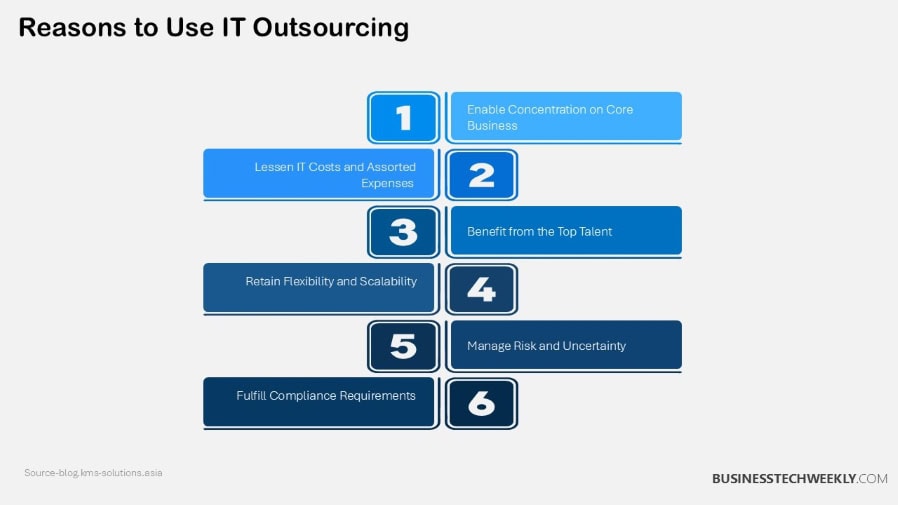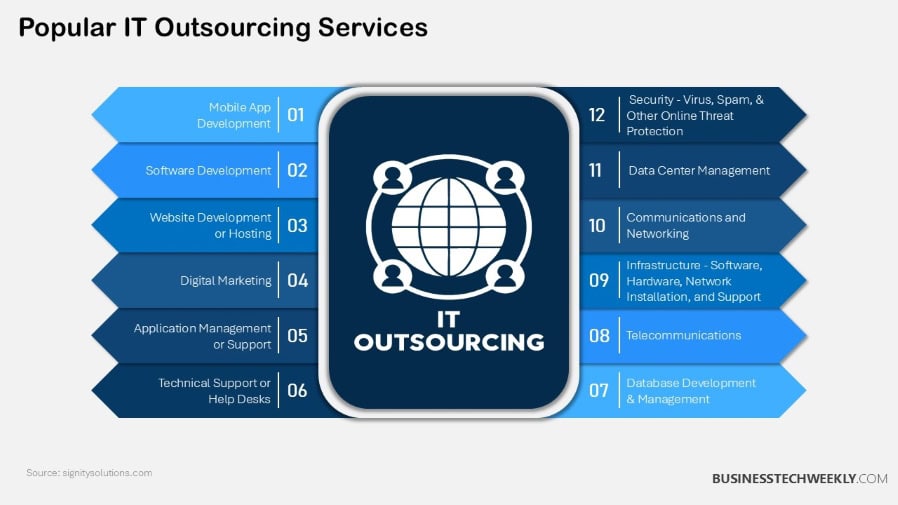IT Outsourcing for Small Businesses: Best Practices for Outsourcing Technology

IT Outsourcing for Small Businesses: In the technology world, outsourcing is a familiar concept. Outsourcing brings together talent from all corners of the globe to improve a company’s core product or business strategy. IT outsourcing can provide many benefits to your small business or start-up operations.
You should remember that your IT outsourcing requirements must be clearly defined. Also, deciding if certain conditions are best for your start-up is essential.
Below, we identify the benefits of outsourcing IT to your small business.
These benefits will help you decide if outsourcing IT for your company is the best option.

On this page:
What does IT Outsourcing include?
If you have never outsourced information technology services before, you probably aren’t familiar with the ins and outs of the agreement.
In a nutshell, outsourced information technology (IT) or managed information technology services refer to having a third party serve as your company’s IT department or, in some situations, supplementing the IT services provided in-house.
There are a variety of IT services that small businesses and start-ups can outsource.
The following is a list of the most common managed information technology services utilized by small businesses:
- Backup & Disaster Recovery
- Cloud or Hosted Services
- Cyber Security & Compliance Management
- Data and Network Security
- Full IT Support & Management
- Help Desk or End User Support
- Infrastructure or Hardware as a Service (IaaS/HaaS)
- Proactive IT Maintenance
- Partial IT Support & Management
- Software and Website development
When should you start to outsource IT?
Most businesses don’t even think about managed IT services until something serious goes wrong on the company’s end, such as an IT employee resigning unexpectedly or a significant cyber assault.
Although information technology businesses can assist in the event of a catastrophe, it is best to investigate your choices before it is too late.
The decision to outsource your information technology services is essential for your company, and you shouldn’t rush to make it.
Spend some time reflecting on the technological benefits you anticipate, the areas in which you would like to see improvements, and any issues you may have regarding the agreement you already have in place.
RELATED: Supplier Management Best Practices

Identifying the Benefits of IT Outsourcing for Small Businesses
IT is used in every modern organization. IT outsourcing for small businesses might be useful even if all you need help with is maintaining your laptop or keeping your email in working order.
Although outsourcing can result in financial savings, this is not the only reason to do so, nor even the most essential one.
However, for small businesses, strategically outsourcing IT services can result in several long-term benefits, including the following:
Control Capital Expenditure
Small and medium-sized businesses that are growing don’t have enough money to set up and run their own IT service. You can’t get the scale economies that an outsourced IT service can give you.
Costs can be too high for a small business to handle IT services in-house.
Focus on What You’re Doing
Small businesses, especially those just getting started, have to focus. Most small businesses and start-ups have a primary focus – this is what they excel at, and it forms their business’s fundamental basis.
Other things, like IT services, can feel like they take attention away from what’s important.
If outsourcing lets you focus on customer service, increasing sales, improving quality, or coming up with new ideas, it may be a good idea.
Your business may only last as long as you can keep your mind on what’s important.
Improved Cybersecurity
Cybercrime and keeping data safe are two big problems businesses have to deal with today. Cybercriminals know how to use technology well.
To protect yourself from their attack, you need cutting-edge skills and tools.
If you don’t think you can handle this threat well, you may need to hire IT services from someone else. It is challenging to master IT security like a professional on a small scale.
It’s hard enough to keep up with the latest tools and techniques. It’s easier for outsourced IT services to find and keep this talent and to keep training and to support them.
Knowledge Gain
You may have already taught your people how to use IT.
You already know that keeping up with technological changes can feel like chasing your tail. As soon as you train your staff, technology changes, and you have to do it all over again.
When you work with an outsourced IT service, you can take advantage of the chances to share knowledge.
Your IT services provider can tell you about the latest ideas. They can also teach your people how to use technology better if that’s what you need.
Capability to manage rare Issues
Your IT systems can be well taken care of by an IT team that works for you. They solve common problems by using their own experience.
IT services that are outsourced are likely to have a lot of experience. They have a wide range of skills, experiences, and knowledge that they can use.
Their experience grows as they work with clients facing various problems and having different opportunities.
When something new comes up, will your team be able to handle it? Even though the problem is unique to you, it’s likely not a new one.
Someone else has already fixed that problem, and your outsourced IT services provider can use that knowledge.
Managing Risks and Disaster Recovery
Even if IT isn’t your primary business, your business would likely suffer if you lost your IT services. Your business could be at risk in a big way.
What IT risks does your business face?
If you don’t understand them, you might not be able to prepare for a power outage as well as you could. You might not be able to make the right plans to make failure less likely either.
IT services that are outsourced can offer IT risk management as a service.
If something terrible happens, IT could be a part of the solution.
Small businesses aren’t likely to have the resources and skills needed to get back up and running after a major technology failure.
If your phone system goes down, you could lose contact with all of your customers. Something goes wrong with your online store, sales could stop. If you don’t keep your data safe, you could lose your reputation or even be sued.
You need access to people who know how to handle risks and recover from disasters.
Human Resources
A challenge in terms of human resource management is the creation and maintenance of an internal IT team.
Simply recruiting candidates requires some technical understanding, which you might not have. IT consultancy for small enterprises is an effective solution to the HR problem.
Staying Up-to-Date with the latest Technology
Technology is advancing at an exponential rate. Even the equipment used in the home is becoming increasingly complex.
The rapid adoption of these technologies is occurring among consumers.
The same may be said about technology in your particular field of business.
Your competitors are eager to get the most recent technology to gain a competitive advantage through its use.
If you outsource your IT services, you may have access to these advances and information on how you may stay competitive.
RELATED: How to measure your SLA: 5 Metrics you should be Monitoring and Reporting

Best Practices for Outsourcing IT as a Start-up or Small Business
Finding a reliable IT outsourcing provider who is capable of producing excellent outcomes is only half the effort that needs to be done.
When determining the parameters of your future collaboration, here are some more considerations to keep in mind:
- Set clear goals: Not that even the best-laid plans often go wrong, but they aren’t always the best-laid plans, to begin with. Be specific. As a small business, when embarking on IT outsourcing, identify what must be done right now.
- Expect to get what you paid for: If you put too much cost pressure on the outsourcer, they will cut corners, like using less experienced workers. Don’t choose based on how much it will cost. The cheapest service provider may not be the best choice. They might not know how to do the job right or take longer (or do it less well) than an experienced pro who charges more.
- Clean up before hiring someone else: Companies often give their problems to outsourcers and are surprised when something goes wrong. How can the company expect the outsourcer to fix the systems if it can’t do it? It’s more challenging for the outsourcer to decide what’s “right” because they don’t know your history, culture, or business context. In the same way, you should set up new systems yourself and hire someone else to operate and maintain them.
- Get the right SLA metrics: IT organizations usually aren’t good at collecting metrics, so they make mistakes, the biggest of which may be accepting the SLAs from their outsourcers (service-level agreements). If the vendor sets the baselines, you can be sure that it was done to minimize risk and penalties and maximize incentives.
IT Outsourcing for Small Businesses: Next Steps
Once you’ve narrowed your choices to your needed services and a couple of providers, it’s time to compare contracts.
Most contracts will have similar terms, but each company has its way of getting results.
RELATED: IT Support Contracts: What should be covered in your IT Support Agreements?
Make sure to ask any questions at any time. The managed IT services companies you talk to should be happy to explain things and help you make a choice.
If they’re not willing to help, they might not be the team for you.
What should your IT Contract or IT Service Agreement cover?
Here is a summary of areas that your contract should cover and make clear:
- Services: Which services are they offering your small business, and how can you take advantage of them? To what extent does each service go, and what are its parameters?
- Response time, reliability, and availability: Who should you contact? Who is the alternative contact? Is this a round-the-clock service? What is the strategy for providing service outside the typical coverage hours? Do you have to pay anything else in addition to that? After reporting an issue, you should also be given an estimate of how long it will take until you hear back from someone.
- Procedures for Proactive System Maintenance and Best Practice Standards: It is essential to record the expectations for proactive measures and the standards for optimal practice in writing. This should include the frequency of maintenance checks as well as the identification of the party accountable for their upkeep.
- Operations and System Requirements: What are their procedures for escalation, and what are the minimum quality requirements for the services they provide?
- Onboarding Mechanisms: Can you tell me about their process for onboarding new customers like yourself? The procedure followed by each organization will be unique. Request a written explanation of their plan.

